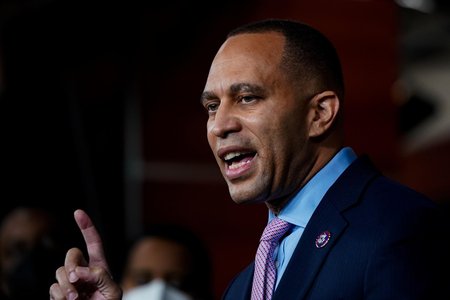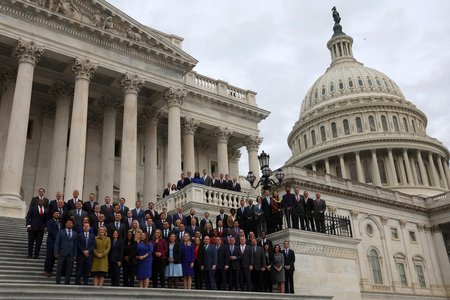With only weeks left to complete their work and before Democrats lose power in the House, the January 6 committee met to discuss whether to make criminal referrals to the Justice Department. Members say the probe’s final report will be released later this month. Plus, the founder of the Oath Keepers, Stewart Rhodes, was found guilty of seditious conspiracy for his role in the Capitol attack.
Clip: Jan. 6 committee could soon announce criminal referrals to Justice Department
Dec. 02, 2022 AT 7 p.m. EST
TRANSCRIPT
Notice: Transcripts are machine and human generated and lightly edited for accuracy. They may contain errors.
Yamiche Alcindor:There are only weeks left before they complete their work and before Democrats lose power in the House.
The January 6 committee, which is doing a lot of work on white supremacist, I should add, met today to discuss whether to make criminal referrals to the Justice Department. And this week, a Democratic Committee Member Zoe Lofgren said that the probe's final report will be released this month.
Meanwhile, on Tuesday, founder of the far-right Oath Keepers, Steward Rhodes, was found guilty of seditious conspiracy for his role in the Capitol attack. The prosecution of him and others from this group is the most consequential January 6th case that have come out of the Justice Department's investigation.
So, Asma, I want to bring you in. We're talking about white supremacy and hate speech. And this, of course, ties into all of that. So, what's your sense of the consequential, I should say, of the impact, rather, of this guilty verdict, the January 6 committee's work?
Asma Khalid: I mean, I think the Stewart Rhodes guilty conviction is really quite monumental. I mean, he was found guilty of seditious conspiracy. That's not an easy charge for prosecutors to -- the jury did convict him of them, sorry. And so that's not an easy charge, I was saying, for prosecutors to get. It is something that they were able to convince the jury that he is guilty of. So, that in itself, I think, is really significant.
The other thing is, though, I think there have been questions about the purpose of the Justice Department doing all of this. And when you get a guilty conviction at this level, to me, it sort of validates the work that the Justice Department has been doing.
Now, again, whether or not that is significant in sort of political context ahead of Republican primaries in 2024 is a totally different thing, but I think it signifies to people that this was significant and that there will be consequences for the behavior that took place on Jan. 6.
Yamiche Alcindor: And, Michael, some of those consequences could be what the January 6 committee is looking at right now, which is criminal referrals.
Michael Bender: Yes, definitely. I mean, this was a huge victory for the Justice Department, no question. They are going to have some cases coming up here in the next few weeks. So, we will see if they can repeat that success. But there are going to be political consequences for this.
And I did want to kind of circle back to something I said earlier. I didn't mean to just suggest that all Trump had left was white supremacists and white nationalists, but he is shedding 10 percent of the party in exit polls from 2020, 2022 as well and heading into 2024. He's not done anything to bring the party back together, which leads into some of the January 6th issues.
We saw the election deniers lose kind of up and down the ballot from coast to coast. And when if the man that Democrats have been charging as most responsible for the riots on January 6, if he is at the top of the ballot, I think you are going to see that continue to play out and have consequences for Republicans for the next couple of years.
Yamiche Alcindor: And, Weijia, just jump here. We've covered Trump together. We've seen him sort of play footsy with some of these groups. What do you make of this? What's your reporting reveal about what's going on?
Weijia Jiang: So, Nia got it exactly right, that this is nothing new, and so did Michael, because I was in that gaggle with Kevin McCarthy when he was first asked about this. And his response was, well, President Trump didn't know who Nick Fuentes was. In unison, me and other reporters screamed like, but he knew who Kanye was, right?
And so I think that is a really important point because President Trump has been here before. And it is always about him. It's not about condemning, you know -- in fact, he has not condemned Fuentes yet, even though now he does know who he is, right? I mean, like it's about him, it's about, well, I didn't know who he was. When it comes to QAnon, it was about, well, I didn't know who they were but they liked me very much.
Of course, this is a political strategy. We can't forget what helped him win in 2016, which is giving a voice to people who thought they didn't have one when it came to saying these things out loud.
Yamiche Alcindor: And certainly when we have to keep uncovering, as we continue to see these developments happen, these scary developers happen.
So, thanks to our panelists for joining us for sharing your reporting.
!FROM THIS EPISODE


Clip: House Dems elect younger leadership as McCarthy struggles for votes to become speaker


Full Episode: Washington Week full episode, December 2, 2022

© 1996 - 2026 WETA. All Rights Reserved.
PBS is a 501(c)(3) not-for-profit organization
